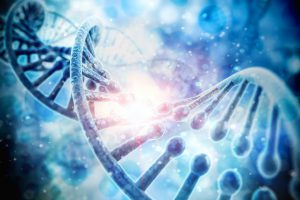
Genetic testing refers to the analysis of human DNA, and has become commonplace in the practice of medicine. According to the National Institute of Health, in the future “genetic testing will be an important part of health care for many individuals…we will live in a time of more effective ‘personalized medicine’. Information from genetic testing will help to detect risk for disease, guide strategies for maintaining health, offer more accurate diagnosis, and guide treatment choices for a wide variety of conditions.”1 OralDNA® Labs offers several genetic tests such as Celsus One™, DNA DrugMap™, MyPerioID® IL-6 (included in Alert 2™) and MyPerioID® IL-1. This blog will highlight general information about genetic testing along with the differences between Celsus One, Alert 2™, MyPerioID® IL-6 and MyPerioID® IL-1.
With genetic testing, our laboratory team extracts DNA from human cells within the specimen that was collected utilizing the simple 30-second swish and gargle collection technique. The gargle aids to exfoliate human cells from the cheeks, palate as well as the back of the throat. Once extraction is complete, the DNA inside the nucleus of each cell is unraveled and specific gene markers are investigated, to reveal the genotype. The genotype indicates the combination of inherited alleles received from each parent. Genetic tests are only ordered and performed once in a patient’s lifetime, as genetic DNA will never change.
The genotypes, our DNA, are a blue print for how we may respond to certain stimuli such as bacteria, stress, environment etc. In the case of periodontal disease, the body usually responds with inflammation/bone loss to a bacterial trigger. Two tests offered by OralDNA® Labs: MyPerioPath® and Alert 2™ can identify the specific bacterial profile, but what about how the body responds? Here are some options for salivary genetic testing:
- Our most comprehensive genetic test identifying eight gene markers: IL-6, IL-1, Beta-defensin 1, CD 14, Toll-like receptor 4, Tumor Necrosis factor alpha, IL-17A and Matrix Metallopeptidase 3
- These gene markers have been independently researched and indicate certain genotypes will generally produce more inflammation/bone loss
Alert 2™ (MyPerioPath® & MyPerioID® IL-6)
- MyPerioPath® will indicate the type and concentration of 11 disease-causing bacteria
- While MyPerioID® IL-6 will identify one gene marker within the interleukin-6 gene, known to produce more inflammation/bone loss
- Best Bargain
- Looks at one gene marker, IL-6, known to produce more inflammation/bone loss
- Looks at one gene marker, IL-1, known to produce more inflammation/bone loss
The OralDNA® Labs collection supply kit and saliva collection method are universal. A single oral rinse sample collection allows you to order any and all lab tests available. MyPerioPath®, our bacterial test option that determines the type and concentration of disease-causing bacteria, can be performed multiple times on the same patient. Follow up MyPerioPath® testing should be performed after therapy to determine the success of bacterial reduction.
So, you may be asking why having the genetic information is so important? Because with this information, the clinician will be able to create a more personalized risk assessment. For example, how is the patient’s genetics contributing to the severity of disease? How will the patient respond to treatment? And/or how susceptible is the patient to relapse? The clinician can now provide even further personalized patient care with this information.
The information from these genetic test options aim to help the clinician achieve the NIH’s prediction of a future where genetic information can help “detect risk for disease, guide strategies for maintaining health, offer more accurate diagnosis, and guide treatment choices for a wide variety of conditions.”1 So Test, Don’t Guess!

References
- https://report.nih.gov/nihfactsheets/ViewFactSheet.aspx?csid=43
For more information on how to become an OralDNA Provider – scan HERE:
- Practicing Dental Medicine: The Partnership with a Clinical Laboratory - December 13, 2024
- Olympic Spirit: Achieving Gold in Healthcare - August 16, 2024
- The Winning Team: The Healthcare Provider & The Clinical Laboratory - April 12, 2024
